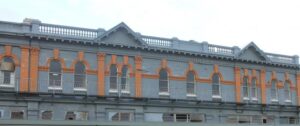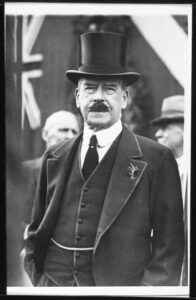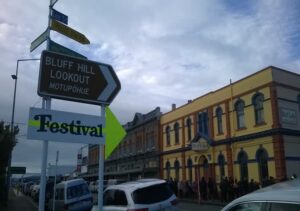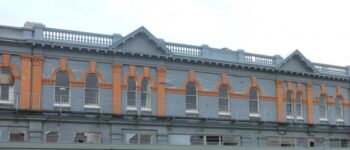1885: The Club Hotel
April 22, 2024
By AHNZ

Bluff’s Club Hotel’s demolition started in April 2024 putting an end to an institution going back to the 1860s. It ceased trading in the mid-2000s. The latest owner, Bluff Oyster and Food Festival Charitable Trust purchased it in 2014 and have been let it deteriorate and be vandalised for 10 years culminating in the ability to over-ride the heritage accreditations and, finally, knock it over.
The Club dates from 1884 but has been re-structured or re-built over the years, especially in 1914. It’s in such a bad state the Bluff Oyster Festival was called off in 2023 least a bit of the building fall on their heads. This loss in revenue and tourism probably twisted the arms of some of the pertinent people to lubricate the bureaucratic pathway so that the building could be smashed up as had long been the plan.
“But as many of you know, one of the main architectural features of Bluff’s main street, the Club Hotel building, which ceased trading in the mid-2000s, is probably going to be bowled over in 2015.” – A World History of Bluff, Facebook (2014)
The special history of the building is that it is the rock upon which Hannah Ward Barron built her empire. After losing 2 husbands and several children she created this hotel as a single woman in the 1860s after working hard as an owner-operator of her own shop. Her first shop was in the right place to prosper from the Greenhills and Tiwai Point goldfields while they lasted. She then moved south to Bluff and had found a place to build her castle at last. Hannah’s accumulation of titles allowed her to build the first incarnations, The Railway Hotel which became the Terminus Hotel. The final form of the building on this site from 1884/5 was The Club Hotel that only in 2024 came crashing down. Ref. Image left, Southland Times (22/4/2024)
“It seems ironic that a building and an institution that people worked hard to build in the face of adversity, time and time again, is now to be simply knocked over. The name Club Hotel will presumably soon fade from lived memory, as did the Boconnoc Buildings; like the Sutherlands and the Kerrigans, and even the Wards, the Flynns will only exist as ghosts in dispersed documentary form.” – A World History of Bluff, Facebook (2014)
“By early May 1870 the Wards had gathered together the necessary £150 to purchase the freehold of the boarding house. The section had a road frontage of 33 feet, and was deep enough to carry extensions to the building. This was the start of Hannah’s accumulation of titles that enabled the imposing Club Hotel to be erected next to the post office. By the time of her death it was the biggest hotel in Bluff, and still has the best facade on to the main street.” – Sir Joseph Ward: A Political Biography, Michael Bassett (1993)
“In the 1860s Mrs Barron leased a guesthouse on the waterfront and set about establishing her own business. In 1870, she converted the boarding house to a hotel, calling it the Railway Hotel. Her children lived with her at the hotel. Her youngest son Joseph Ward lived with her until his marriage in 1883. Joseph Ward became an important businessman and politician. Ward was twice mayor of Campbelltown, as Bluff was then called. He was elected to Parliament in 1887, and became Prime Minister in 1906.” – Heritage New Zealand
“Bluff Oyster and Food Festival Trust member Kylie Fowler said the trust bought the building in 2014 and had tried “everything possible” to sell it. “The trust can’t afford to maintain it, nor have we a reason to use it. We advertised it and we did not have anyone interested in purchasing it. So what else you do?”” – Councillor backs bid to knock down Club Hotel, ODT (2019)
 Hannah’s family, those who survived, had made it now. Son Joseph Ward became a big businessman, mayor, gained a knighthood and baronetcy. He became Prime Minister of New Zealand because of the confidence and financial skills instilled in him by Hannah who raised him in this building.
Hannah’s family, those who survived, had made it now. Son Joseph Ward became a big businessman, mayor, gained a knighthood and baronetcy. He became Prime Minister of New Zealand because of the confidence and financial skills instilled in him by Hannah who raised him in this building.
As Bassett writes, Ward passed between the hands of two women seamlessly. He lived with Hannah in The Club until the age of 27 at which point we moved out of home a married man.
Joseph Ward formed part of the Liberal’s 2-man leadership team alongside Richard Seddon. I find it fascinating that both Ward and Seddon were pulled out of the weeds of obscurity by strong-willed women. Richard’s wife Louisa Seddon had left Melbourne to be a shopkeeper and hotelier in the pioneer back blocks of New Zealand. Joseph’s mother Hannah Barron Ward had also left Melbourne to be a shopkeeper and hotelier in the pioneer back blocks of New Zealand. It doesn’t take much pattern-recognition skill to notice something was going on here in the background of the story of the Liberal Government which dominated New Zealand for 20 years.
The strong influence of Louisa Seddon has been published in Louisa Seddon: New Zealand’s Secret Queen. Rick Giles, Traces Magazine (March 2024)
 The Club got in on the ground floor in order to be in prime of place to sift all the money and influence passing through the international port of Bluff. It was right next to the post office, and the grocer. When the Bluff Branch railway came in 1867 it had to run between the hotel and the waterfront as Hannah had surely foreseen. Bluff’s main railway station was placed directly opposite The Club. If the Customs House and Court wasn’t where the family wanted it then they certainly made sure when Ward opened a new combination building for both. Ref. 1900: Bluff Courthouse, AHNZ
The Club got in on the ground floor in order to be in prime of place to sift all the money and influence passing through the international port of Bluff. It was right next to the post office, and the grocer. When the Bluff Branch railway came in 1867 it had to run between the hotel and the waterfront as Hannah had surely foreseen. Bluff’s main railway station was placed directly opposite The Club. If the Customs House and Court wasn’t where the family wanted it then they certainly made sure when Ward opened a new combination building for both. Ref. 1900: Bluff Courthouse, AHNZ
We must understand that The Club wasn’t just hoovering up all the money and power generated by the growing town but all Southland. Invercargill (est. 1856) was a growing concern in itself but lacked the good shipping port Bluff had. Southland’s lifeblood and nerve center flowed through Bluff’s Gore Street and therefore into the barrooms of hotels like The Club and The Eagle. Hannah’s property investment turned out to be a stroke of genius for getting in so early. As Bassett writes in Ward’s biography: “The port had been designated an official port of entry to New Zealand in 1856 and smaller vessels from Melbourne occasionally docked there. The novelist Anthony Trollope, who was familiar with Ireland, arrived in Bluff in 1872. His description of it may give a clue as to why Hannah settled there. ‘The place at which we landed had a quay, and a railway, a post office, and two inns; but it had nothing else.”
With an assets like this an ambitious mother could rise her son to be a king. Here’s one who did.
—
Image ref. Club Hotel, ODT (2019)
Image ref. Club Hotel during Oyster Festival 2018, AHNZ Archives (2018)
Ref. Railway Station Bluff, Radcliffe, Auckland Libraries
 Like Comment Share
Like Comment Share





